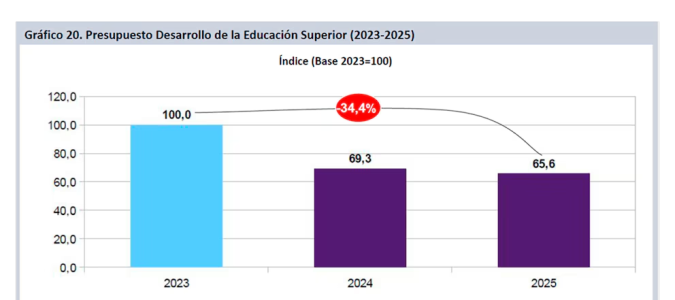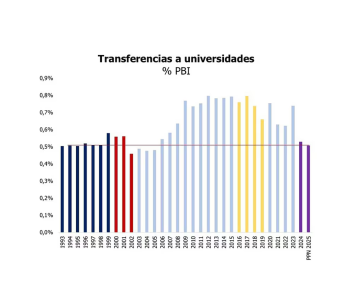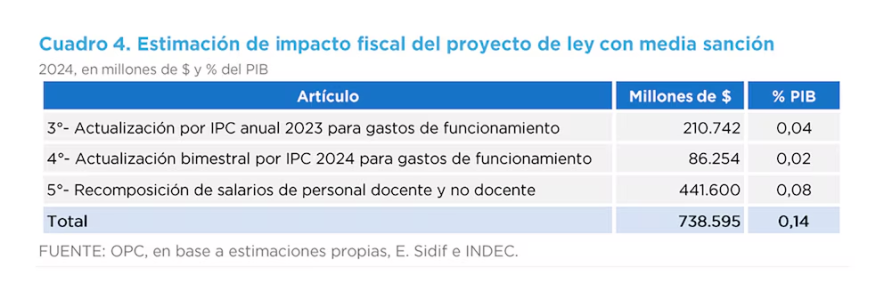All the Answers
Well-known member
The adjustment figures that precipitated a new Federal University March - Infobae

Source:

Los números del ajuste que precipitaron una nueva Marcha Federal Universitaria
La movilización se enmarca en el rechazo al veto de Javier Milei a la ley que recompone el financiamiento de las universidades, pero también en medio del reclamo por el ajuste en partidas de funcionamiento y salarios docentes
October 02, 2024
The mobilization is part of the rejection of Javier Milei's veto of the law that recomposes the financing of universities, but also in the midst of the claim for the adjustment of operating budgets and teacher salaries.
By Augustin Maza

President Javier Milei will face a new and massive Federal University March on Wednesday, the second in his almost ten months in office (REUTERS)
President Javier Milei will face a new and massive Federal University March this Wednesday , the second in his almost ten months in office. The mobilization is part of the rejection of the presidential veto of the law that recomposes the financing of higher education institutions, but also in the midst of the demand for the adjustment of operating expenses and the salary of both teachers and non-teaching staff.
The cut in transfers to universities is undeniable, if we look at the data on “cash basis” spending, that is, the payments actually made by the National Public Sector. In the first eight months of the year, transfers accumulated a fall of 33.5% compared to the same period of the previous year, equivalent to a drop of $746,585.89 million, according to the Argentine Institute of Fiscal Analysis (Iaraf).
It is important to note that the Government is handling the budget at its discretion, since the 2023 Budget was extended in the absence of a sanction last year. However, the expenditure projection proposed by the Executive Branch for 2025 implies a continuation of the adjustment path or, at best, does not foresee a recomposition of funds for higher education institutions.

Ibero-American Center for Research in Science, Technology and Innovation (Ciicti)
The Ibero-American Center for Research in Science, Technology and Innovation (Ciicti) highlighted that the 2025 Budget project, which has yet to be discussed in Congress, has a projection of $3.8 billion for the 62 national universities and their dependencies. “The allocation would imply a 34.4% drop in the university budget in two years,” they explained.
According to a report by the Argentine Association of Budget and Public Financial Administration (ASAP), spending on universities would increase by 0.8% in real terms next year compared to the current year, which would not compensate for the decline in recent years. This guideline assumes that inflation in 2025 will be 18.3% for the entire year.
The consulting firm Empiria has calculated that the transfers to universities planned for 2025 would be equivalent to 5 points of GDP and would reach the lowest level in the last 20 years.
Universities say that operating costs represent only 10% of the budget, while 90% corresponds to salary expenses.

Empiria
In this regard, regarding the salaries of teachers and non-teaching staff, Ciicti noted: “The budget for activities 12 and 13 of Program 26, which express the salary mass applied to teaching and non-teaching staff salaries in universities, after falling more than 30 real points in 2024, will continue to deteriorate in 2025. The real accumulated contraction in this two-year period is 37.2%.”
The National Federation of University Teachers (Conadu) stated that the accumulated loss of purchasing power is 9.2% compared to December. As detailed, a first-class assistant with simple dedication (nine hours a week) and ten years of seniority, who in December received $132,035.51, in August began to receive a gross salary of 232,531.90 pesos. The drop compared to November is 23.71% since the inflationary jump in December due to the devaluation is not considered.
It is within this framework that the debate on the Education Financing Law that was approved by Congress and that Milei said on several occasions that she would veto comes in, although there are doubts about whether she has the necessary votes in both chambers to avoid a legislative setback.

The cost of the educational financing law for 2024 is equivalent to a third of the pension reform vetoed by Milei
The regulation contemplates a recomposition based on the variation of the Consumer Price Index (CPI) of the Indec on the items allocated to universities and a bi-monthly update going forward, with the discount of the increases granted so far in 2024. It also proposes an increase in the salaries of teaching and non-teaching staff so that they reach the levels of December 2023, in real terms, so that they then follow inflation on a monthly basis.
A report from the Congressional Budget Office (CBO) estimated that the cost of the law is $738.595 billion for the remainder of 2024, equivalent to 0.14 points of GDP. Universities point out that the magnitude of this expenditure is equal to one month of financial surplus, a third of what the pension reform vetoed by Milei cost or a third of what the State will stop collecting due to the reform that benefited those who paid Personal Property Tax.
The President has warned on several occasions that he will veto any law passed by Congress that involves spending that threatens fiscal balance, that is, that does not have financing behind it. That is why the veto will be announced in the next few hours.
The Ministry of Human Capital , headed by Sandra Pettovello , stated that “public university education will never be defunded.” The ministry said that universities “did not accept” an additional 6.8% increase in October salaries, that universities received more money “but they do not know how to manage it,” that institutions “do not allow themselves to be audited,” they point to the cost of financing “foreign students,” and that 60% of students at higher education institutions are not in “regular” status.

